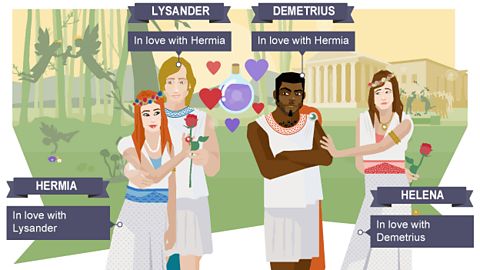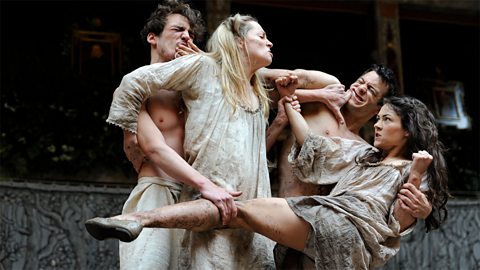Key points
Helena is one of the main characters from A Midsummer Night’s Dream, a comedy by English playwright William Shakespeare.
Helena is in love with Demetrius, but he loves Hermia. Hermia loves Lysander and they run away to get married. Helena and Demetrius follow them into the woods.
Fairy magic makes both Lysander and Demetrius fall in love with Helena, but she doesn’t believe either of them.
Did you know?
Performances often have a tall actor playing Helena and a short actor playing Hermia. There are lines in the play that suggest there is a height difference between the two friends. For example, Hermia insults Helena by calling her a “painted maypole”.
Plot summary
Helena’s key moments
Click through the slideshow to see Helena’s key moments

Image caption, Helena loves Demetrius but he is in love with Hermia, who in turn wants to marry Lysander. Hermia and Lysander run away to be together and Helena and Demetrius follow them.
Image caption, Puck accidentally makes both Lysander and Demetrius fall in love with Helena. Helena thinks the men and Hermia are mocking her.
Image caption, Demetrius and Lysander fight over Helena while Hermia blames Helena for the change in Lysander’s affections. Oberon and Puck reverse the effects of the love potion and Lysander loves Hermia again while Demetrius still loves Helena.
Image caption, Helena and Demetrius get married alongside Hermia and Lysander and Theseus and Hippolyta.
1 of 4
Character traits
Frustrated
Helena is frustrated at the beginning of the play because Demetrius does not return her love.
Suspicious
Even when Demetrius later declares his love, she thinks he is mocking her. She is suspicious when both men switch their affections from Hermia and say they love her. She also suspects that her friend Hermia is involved in the joke and that everyone is mocking her.
Untrustworthy
Hermia shares her secret plan to run away with Lysander with her friend Helena. Helena betrays her friend by sharing this secret with Demetrius, in the hope of gaining his affection.
Witty
Helena is a witty character and makes jokes even when she feels frustrated and unhappy.
Relationships
Helena loves Demetrius. Demetrius rejects Helena’s love and is unkind to her when she follows him into woods. However, at the start of the play it is made clear that Demetrius and Helena have previously had a romantic relationship.
Helena is friends with Hermia, and they have known each other since childhood. Despite their friendship, Helena breaks Hermia’s trust and tells Demetrius she has run away with Lysander. Helena is jealous of Hermia because Demetrius loves her.
Demetrius later falls in love with Helena because of Puck’s love potion. At the end of the play, it is implied that his feelings for Helena are genuine and they get married.
Why do Helena and Hermia fight in the woods?

Hermia and Helena argue when both Lysander and Demetrius switch their affections to Helena. Hermia blames Helena, and Helena thinks Hermia and the men are playing a trick on her.
Changes in character
Helena is lovesick and suffers from unrequitedA feeling that is not returned. love at the start of the play. She tells Demetrius where Hermia and Lysander have gone to please him, but Demetrius then cruelly rejects her.
Oberon sees Demetrius rejecting Helena and tells Puck to give Demetrius a love potion. Puck mistakenly puts the love potion in Lysander’s eyes, and then in Demetrius’ eyes. Both men fall in love with her.
Helena is very confused and suspicious when both men say they love her. She doesn’t believe that they could have switched their affections so quickly from Hermia. She fights with Hermia, who blames her for the change in Lysander’s affections.
At the end of the play, all the confusion is resolved and Helena and Demetrius are in love with each other. They get married alongside Hermia and Demetrius.
Activity - Order it
What do these key quotations mean?
The more I love, the more he hateth me.
Helena
Act 1, scene 1
Helena loves Demetrius, but he rejects her love and says he hates her. Despite this Helena follows him into the woods and refuses to leave him alone.
Let her not strike me. You perhaps may think,
Because she is something lower than myself,
That I can match her.
Helena
Act 3, scene 2
During their argument, Helena makes a joke about Hermia’s height and admits that she is no match for Hermia in a fight.
O spite! O hell! I see you all are bent
To set against me for your merriment:
Helena
Act 3, scene 2
Helena thinks the other characters are mocking her for their own amusement. She doesn’t believe that Lysander and Demetrius are in love with her. She also believes that her friend Hermia is a part of the trick.
Listen to a scene
This audio clip is from Act 2, scene 1, when Helena describes how upset she is that Demetrius does not return her feelings. Listen to the clip and then answer the question below.
Helena: Love looks not with the eyes, but with the mind,
And therefore is winged Cupid painted blind.
Nor hath Love's mind of any judgement taste;
Wings, and no eyes, figure unheedy haste;
And therefore is love said to be a child
Because in choice he is so oft beguiled.
As waggish boys in game themselves forswear,
So the boy Love is perjured every where.
What does Helena compare love to?
In an extended metaphor Helena compares love to a boy. This kind of metaphor is called personification because love is given human characteristics in the description.
Test your knowledge
Play Bitesize secondary games. gamePlay Bitesize secondary games
Have fun playing science, maths, history, geography and language games.

More on A Midsummer Night's Dream
Find out more by working through a topic